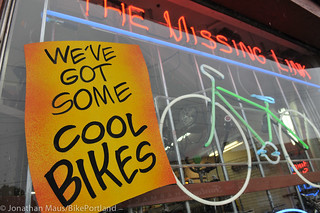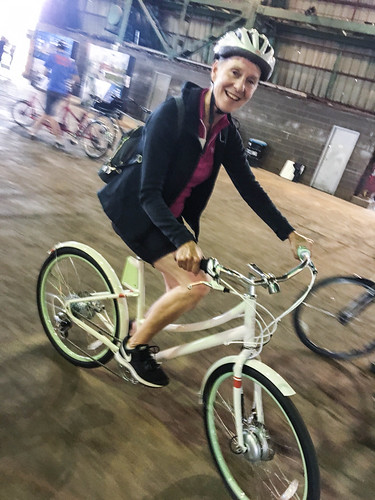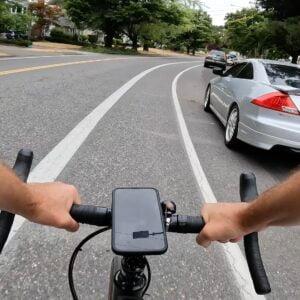Oregon’s infamous $15 bicycle excise tax goes into effect in just 20 days.
On January 1st, bicycle retailers across the state will have to be registered with the Department of Revenue (DOR) and have systems in place to collect and record the fee. To help make sure shops are ready, DOR has sent notices in the mail and has set up a website with more information.
We’ve been in touch with many Portland-based bike shops to hear how they’re feeling about it. So far we’ve heard a range of opinions. Some shop owners disagree with the tax in principle and/or have concerns about how it will impact their business, while others don’t think it’ll be that big of a deal.
As for the tax itself, the first order of business from the State’s perspective is to educate retailers. In a letter (PDF) sent to shops on December 4th, the DOR laid out the basics of the tax and offered answers to several frequently asked questions.
In order to comply with the new law, bike shops will have to collect the tax from every new bicycle sold in Oregon or on bicycles sold online to an Oregon customer. The tax must be identified on the buyer’s receipt and dealers must file a report on taxes it has collected to the DOR at the end of each quarter (first report being due April 30th, 2018). The DOR has set up an online system where shops can register and make their filings electronically.
To review, here’s when the tax applies: all new bicycles with a sale price of $200 or more, with wheels 26-inches or larger, and that are “exclusively human powered and designed for use on the ground.”
A few quirks worth knowing
One thing we got wrong in our previous reporting has to do with electric-assist bikes. Because of the “exclusively human powered” clause, e-bikes are clearly exempt from the $15 excise tax. However, another new tax passed last session called the “vehicle privilege tax” that charges auto dealers a 0.5% tax per vehicle, also applies to e-bikes. The detail we overlooked is that the 0.5% privilege tax only applies to e-bikes sold at licensed auto dealerships. That means e-bikes sold at bike shops are exempt from any new taxes. Yay for e-bikes!
Folding bikes with small wheels from brands like Brompton, Bike Friday, and Tern are also exempt. And because the law says, “wheels” (plural) must be 26-inches or larger, many long-john or “bakfiets” style cargo bikes — which have a large rear wheel and small front wheel — are also exempt.
The other part of the law that has caused confusion is how the location of a retailer impacts whether or not the tax is collected. According to the DOR, the tax applies to retail sales, “made in Oregon or online to Oregon customers.” This is good for Oregon-based bike shops who sell to out-of-state customers (something that happens more often than you think). But what about retailers from other states who sell to Oregonians? Because only Oregon-based retailers have to register and pay the tax, these purchases would be exempt. That loophole appears to give an advantage to out-of-state retailers. (We’ve got feelers out to confirm and clarify this and will update the post when we hear back).
And here’s something we didn’t know: If a shop fails to charge you the $15 when you buy a bike, it’s your responsibility as the customer to pay up directly to the state (you can do it online here).
What bike shop owners and employees say
We reached out to several Portland bike shops at the end of October to ask them about the new tax. Most of them said administration of the new tax won’t be that difficult; but that’s not the only thing on their minds…
Carrie Leonard, Islabikes (direct-to-consumer brand that specializes in children’s bikes):
“As a first consequence of the newly enacted Oregon Transportation Bill, Islabikes has lost a children’s bicycle sale. We received an email yesterday from a potential out of state customer who is not going to purchase an Islabike because he doesn’t want to support this type of legislation and he also feels the law as written should not apply to our bikes. Counter to the insistence of the legislators that this was only to tax adult riders, your local children’s bike manufacturer is both collecting the tax and losing sales. If this is the beginning of a trend, not only will we be taxing behavior we should be incentivizing, we will be penalizing Oregon-based bicycle companies. While $15 is a small percentage of the purchase price of our bikes, the impression that Oregon is taxing something that it shouldn’t is all it can take to drive consumers elsewhere.”
Advertisement
Bill Larson, Cyclepath (high-end bikes and lots of custom builds):
“Yes, we’ve heard people talking about it. There’s typically two sentiments that people speak to.. Some individuals are not concerned with paying the tax as long as it goes to something “worthwhile” or cycling related, however, they typically are of the belief that administration of said tax wont leave much left for the worthwhile part. The other typical sentiment is that they wouldn’t mind paying it as long as it wasn’t framed in the idea that cyclists dont already pay their own way. The tax to them seems punitive, for years of not contributing.”
Tommy Tuite, Tuite Bicycle Repair (small neighborhood shop):
“At the moment, Im not anti tax. But I do think who ever suggested it is a jerk. Most of my customers are not looking to spend alot on a new bicycle… Although I do carry a handful or bikes on my floor, my biggest complete bicycles are awesome single speed bikes that cost $199. My biggest concern is how the tax is intended to be spent. Bikes don’t damage roads, they improve them by being one (or more) less car. If anything, they should spend the money on bicycle safety programs, driver education and bicycle theft recovery/prevention.”
Eva Frazier, Clever Cycles (family, transportation, and cargo bikes):
“For bike sales as a whole in our shop, we can’t just universally apply the tax to “adult bicycles”, as we sell a number of folding bikes and cargo bikes that don’t fit the rule of 26″ wheel or larger. Now’s the time to buy a Brompton [a popular folding bike with 16-inch wheels]!
Talk about the tax has subsided since the buzz in the summer. I imagine it’ll get implemented, we’ll collect what we need to collect, and not a whole lot will change. The only constant is change in this world, and we’ll adapt.
I doubt that we’ll lose sales, but I think we’ll need to come up with some marketing around why the tax exists and why its a good thing. Negativity about the tax will help no one at this point.”
The Outer Rim (east of I-205 in Gateway district):
“We are salty about this whole issue! We are not prepared and it is a huge burden to set up the admin piece of this new tax. We believe we will loose a large number of sales due to our proximity to other towns where the tax does not apply. I know I would go 10 min out of the way to not pay a new useless tax.”
Mel Birge, Recumbent PDX:
“ At $15, this strikes me as silly, non-tax-revenue-producing-make-work for already overwhelmed bike retailers. Unless, that is, we’re forecasting a million bikes sold in Oregon.
I’m not opposed, on principle, to a sales tax. But, it’s strangely the third rail in chronically underfunded Oregon and, if the state imposes too much of it, all our sales go straight to Amazon. There are recumbent trike shops in California that lose business to a scummy online Utah trike operation with shipping charges a fraction of the California sales tax.
To be fair, our shop is the beneficiary of tax tourism. Folks come to our store after test riding in their local Washington or California shop. When we find out a customer made their buying decision based on a test ride elsewhere, we profit-share with that local shop (keeps us on good terms in the very small recumbent community).
Every percentage point of sales tax is exactly that much more advantage to Amazon (or the scummy Utah trike operation).”
Western Bike Works (two regional locations and large online business):
“Western Bikeworks will be paying the bike tax on behalf of our customers.”
So there you have it. A mix of feelings as we enter this new era of taxation in Oregon.
If all goes according to plan, the State claims the new tax will only cost $100,000 per year to administer while it raises $1.2 million for the existing Connect Oregon grant program (which only funds projects that are exclusively “off-highway” like paths and trails).
DOR plans to issue a press release this week to raise awareness of the new tax and to inform any bike retailers that aren’t on their mailing list. Check out the official website to register your shop and learn more.
— Jonathan Maus: (503) 706-8804, @jonathan_maus on Twitter and jonathan@bikeportland.org
Never miss a story. Sign-up for the daily BP Headlines email.
BikePortland needs your support.









Thanks for reading.
BikePortland has served this community with independent community journalism since 2005. We rely on subscriptions from readers like you to survive. Your financial support is vital in keeping this valuable resource alive and well.
Please subscribe today to strengthen and expand our work.
Much like some e-bikes now have faux pedals, I now expect some regular bikes that will have faux motors.
To save $15?
This makes me sad. Not because the $15 is incredibly significant but that it is such a powerful signal of where our society is going. We have huge problems with regards to pollution, climate change, energy, congestion and the cost burden on the working class. In every case bicycles are a significant answer. That we have now decided to tax them and in a tiny way discourage them means that we are not serious about our future on the earth and have committed to living in a fantasy land of delusional thinking.
I completely agree. The tax is a symbol of bad bureaucracy and placing a penalty on forms of clean, green transportation. It is also a reminder that our elected officials no longer represent us.
but yet, let us not tax or ban metal-studded car tires in Oregon.
This.
I swear, if I ever get yelled at for “not paying my fair share” by someone driving with studded tires, I am going to completely lose it.
“If all goes according to plan, the State claims the new tax will only cost $100,000 per year to administer while it raises $1.2 million for the existing Connect Oregon grant program (which only funds projects that are exclusively “off-highway” like paths and trails).”
My optimistic side says, perhaps this will help move along the Salmonberry Trail (http://salmonberrytrail.org/) or the North Portland Greenway (https://npgreenway.org/). My pessimistic side says, gee $1.2 million for more unauthorized camps in public spaces.
Sigh…, I sure hope optimism wins.
Stephen
Those figures assume about 867,000 new bikes will be sold per year, and taxes will be collected on them. And does that administration cost include costs to dealers to properly account for collection? Or does it only consider government collection/distribution costs?
You mean about 80,000 bikes per year, don’t you?
I think so—thanks. I don’t know how I got the 867k number…
I guess I really meant 86,666. I meant to do (1.2M + 100k) / 15. I just added an extra 0 somehow.
I’m sure the $100,00 estimated cost of the tax (basically the cost of one additional FTE, including benefits, at typical state-government pay levels) is only the cost to the state. I’m sure the cost to dealers is not included, significant and harder to quantify.
did you see the website link to the program? right now they’re just funding some shipping intermodal facilities. I see no projects dealing with bike or pedestrian travel.
they tout the tax as supporting non-car travel…yeah…basically right now just sea and rail shipping.
This is a scam. Tax studded tires!
What defines “new”? If a bike store sells a new frame with used wheels, is that a new bike?
The bike tax seems to invite using a loophole to avoid it. Couldn’t you just seel a bike without a front wheel, and include the front wheel, then offer a front wheel “deal” for an additional $1? Or put a small wheel on for the purposes of the sale and offer a wheel “exchange” or customization? It is probably not worth it, and the tax is very counterproductive, but it seems pretty avoidable.
As someone pointed out earlier, you could sell a bike without the saddle.
https://www.oregonlaws.org/ors/801.150
I will be posting a notice in my shop with the details of the tax, and the contact info for their state-level elected trepresentatives. If you don’t like the tax, tell them about it.
Us too! I optimistically hope these funds DO go towards paths, trails, and other pedestrian and bicycle infrastructure. It’s a bummer that this is hitting small businesses so directly (Comedic tragedy anyone?). Will it compel consumers to buy low priced bikes from big box stores? Or purchase from WA? I don’t know. Many low prices bikes mechanically fail shortly after purchase – it sucks for the consumer big time and we definitely don’t want to see more that.
Competing with the internet gives us plenty to keep us on our toes, so we’d like if the tax didn’t dissuade folks from purchasing locally.
At the end of the day, we hope people will shop with us because they like our work, and our mission. We haven’t quite figured out how we’re going to tackle this tax, but the goal is for it to impact customers as little as possible.
Jonathan – given your research…it looks like Islabikes should contact that out-of-state customer and see if they are still interested…if that customer was really interested (I would assume they could have bought the bike before 1 January if they hated the tax.)
Hi Todd. Thanks for the suggestion. When we originally contacted Jonathan about this lost sale, it wasn’t apparent that the tax would only be applied to Oregon residents. Once the State issued the collection rules, we did contact the out of state customer. He still chose to not purchase a bike from us, even though he did not have to pay the tax, because he was unhappy supporting a business located in a state that would tax bicycle purchases specifically. Carrie.
Plenty of used bikes out there.
So couldn’t I just drive to Washington or order from another state?
This is a punitive tax and the optics on it are terrible. That’s the direction we are headed in as a society, it seems.
The way I read it, you could drive to Vancouver, use your Oregon DL to get out of paying WA state tax and also not pay the OR bike tax because WA stores aren’t affected. This is exactly the situation The Outer Rim faces. Due to it’s proximity to I-205, you can literally save yourself $15 by driving 20 minutes to Camas Bike & Sport. For a $300 bike you save yourself 5% minus the driving gas and time.
Practically speaking, the odds that:
1) This theoretical Vancouver shop has the same bikes as Outer Rim; and
2) The bike is priced within $15 of Outer Rim’s price; and
3) The customer is willing to drive 30 minutes round trip; and
4) The customer is willing to forgo the good-will of Outer Rim for future maintenance of the bike
just to save $15 (or less), are vanishingly small.
For the upcoming 2018 short session democrats are considering republican proposals that would raise necessary revenue by taxing medicaid providers, low-income housing nonprofits, renewable energy infrastructure, and vegetarian/vegan restaurants.
Yeah, that’s just unreasonably classy.
The GOP promises the sky, the moon and happiness but rarely ever delivers. My guess is that bicycle infrastructure spending is likely to be the SAME and could possibly be even LESS than the previous budget cycle WITHOUT the bike tax. And there will be tax infrastructure to cover as well. It could very well be a net loss for everyone. I’ll keep a close eye on this but, as with many laws like this, the legislators responsible may not be around to feel the repercussion from their legislation.
I have already stated this many times before but the tax is stupid policy that directly counters Oregon’s Bicycle Bill. The point of the Oregon Bicycle Bill was that money spent on bicycle infrastructure SAVES the state money because anyone switching from driving to bicycling is consuming far less resources as far as state road infrastructure is concerned. The bicycle tax is incentivizing the opposite essentially raising state infrastructure spending.
My feeling is that the bicycle tax was the result of Eastern Oregon legislators who didn’t like Connect Oregon spending over $6 million in the last budget cycle on projects that weren’t rail terminals or airports in their districts. If it was really about making everyone have “skin in the game” as someone blurted out that hateful phrase, then studded tires would have bore the brunt of the tax. Unfortunately, Les Schwab has been through that rodeo before and their lobbyists know all the plays. It was never about saving the state money. It was never about good policy. It was never about fairness. It was about protecting Eastern Oregon intermodal rail, airport and barge projects funded by Connect Oregon. That’s where your bike tax money will go, to keep those projects in play in the next budget cycle.
Doesn’t Oregon define a bicycle as having a saddle and pedals? It seems pretty simple to avoid the tax if one wishes.
What bothers me most isn’t the tax, it’s the fact that this legislature has found a tax that I not only dislike but one that I would actually bother to avoid. I’m philosophically pro-tax. I almost always see taxes as the price of admission to civilization. However, taxing the one form of transportation that can dramatically reduce climate changing emissions while simultaneously reducing sedentary lifestyle disease, both of which are costing lives, money and perhaps civilization itself, is so stupid I simply must make an exception to my pro-tax rule.
It’s true, Oregonians do not like sales tax. We love our property tax, gas tax, income tax, art tax, but not a sales tax on any type of consumer product… We’ve seen this type of sentiment on taxes for years.
Sales taxes are regressive, in general.
“’Western Bikeworks will be paying the bike tax on behalf of our customers.'”
Super awesome of these guys!
What…no car infrastructure tax?
Haven’t you heard of the “Road Tax” that we cyclists don’t pay? 😉
You forgot your sarcasm mark. For those who don’t understand: almost all bicyclists have cars too and pay all the same taxes as all the other car owners. Besides, every bike trip that replaces a car trip *reduces* the cost of roads.
my question is, what is the money being used for? Is it for bicycle related programs or just for the general fund?
Yes, there is a gas tax that offsets, but not.pays for the damage that cars and trucks directly causes. What if cars came with a 1000 per pound tax?
The wheels on my road bikes are never bigger than 622mm which is about 24″ so I guess all road bikes are exempt.
Please note that many nominally 26″-wheeled bikes have wheels measuring less than 26″. Take your typical “26”” MTB (ISO 559 mm bead seat diameter on the rim, about 22″) and put street tires on — anything slimmer than 2″ — and you’re under 26″ total diameter. So even most of our 26″-wheel bikes are exempt. We’ll let zealous customers self-report their crime if we fail to levy the tax in these instances.
Target just insisted on charging an extra $15 on a $189 bike. Manager said it was on sale and was above $200 before. So I didn’t buy it and will go elsewhere for a $150 bike.
I suggest craigslist if you’re looking for a $150 bike worth riding.